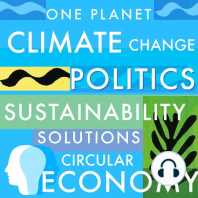20 min listen

Highlights - Lars Chittka - Author of "The Mind of a Bee” - Founder, Research Centre for Psychology, QMUL
Highlights - Lars Chittka - Author of "The Mind of a Bee” - Founder, Research Centre for Psychology, QMUL
ratings:
Length:
15 minutes
Released:
Sep 7, 2022
Format:
Podcast episode
Description
"Many of us are now aware that bees are in trouble due to manmade changes to the environment. Large-scale industrial agriculture, of course, means that often there are no floral resources over very large areas of farmland, and bees' flexibility in locating food sources of course can cope with that to some extent because they're very good at locating patches, but this ability only goes so far. Of course, if there are literally no flowers left or very few, then their learning ability won't help them very much.In addition, of course, there is very heavy usage of pesticides and herbicides in industrial agriculture. And these substances in many cases have been designed to be lethal or at least harmful to insects because they are meant to keep herbivores at bay. And of course often, even if insects don't eat the leaves, flower-visiting insects still get exposed to them in the contents of floral nectar or pollen. So they carry these poisons back to their hives, their nests, albeit perhaps in lower concentrations that they're available in the leaves, but they're still present at a level that's harmful to bees so that affects their navigation, that affects the health of their young. So these manmade changes have a huge impact on bees and this is typically measured in those bees that are least affected - that is honeybees.”Lars Chittka is professor of sensory and behavioral ecology at Queen Mary University of London, where he founded a new Research Centre for Psychology in 2008 and was its scientific director until 2012. He is the author of The Mind of a Bee and is the coeditor of Cognitive Ecology of Pollination. He studied Biology in Berlin and completed his PhD studies under the supervision of Randolf Menzel in 1993. He has carried out extensive work on the behaviour, cognition and ecology of bumble bees and honey bees, and their interactions with flowers. His discoveries have made a substantial impact on the understanding of animal intelligence and its neural-computational underpinnings. He has published over 250 peer-reviewed articles, and has been an editor of biology’s foremost open access journal PLoS Biology since 2004. He is an elected Member of the German National Academy of Sciences (Leopoldina), a Fellow of the Linnean Society and Royal Entomological Society, as well as the Royal Society of Biology.http://chittkalab.sbcs.qmul.ac.uk/Lars.htmlhttps://press.princeton.edu/books/hardcover/9780691180472/the-mind-of-a-beehttps://journals.plos.org/plosbiologywww.oneplanetpodcast.orgwww.creativeprocess.infoPhoto credit: Markus Scholz / Leopoldina
Released:
Sep 7, 2022
Format:
Podcast episode
Titles in the series (100)
Noah Wilson-Rich · Co-founder/CEO, The Best Bees Company, Largest US Beekeeping service...: Interviewed by Mia Funk & Sydney Field · Associate Podcast Producer Sydney Field by Sustainability, Climate Change, Renewable Energy, Politics, Activism, Biodiversity, Carbon Footprint, Wildlife, Regenerative Agriculture, Circular Economy, Extinction, Net-Zero · One Planet Podcast